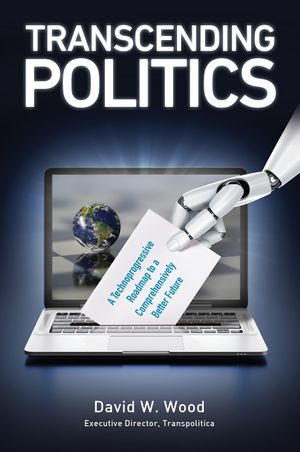Chapter 11. "Nations and supernations"
Chapter 11. "Nations and supernations" is the title of the eleventh Chapter in the book Transcending Politics by David Wood.

"As I’ll argue in this chapter, the problems and opportunities of local politics are mirrored and magnified by the problems and opportunities of international politics:
Bad international politics, via both incompetence and malice, is preventing the adoption of optimal regulatory policies which, in order to be fully effective, would need worldwide endorsement
Bad international politics is creating problems of its own; via misguided over-zealous cross-border pursuits of half-truths, it increases the likelihood of global schism, military conflict, and planetary catastrophe."
- - David Wood, Executive Director, Transpolitica[1]
Assessing international politicsПравить
As a prelude to discussing international politics, let’s briefly remind ourselves of the constructive role that politics can play in society. Politics is the process of collectively agreeing which constraints we put on each other’s freedom.
The prisoner’s dilemmaПравить
Arms races involving military weaponry are one example of international politics failing. At each step in such a race, any country which perceives itself as falling behind its potential enemies can see a logical case to improve its armaments, so as to reduce the chance of it being overpowered in conflict.
Globalisation unravellingПравить
The fall of the Berlin Wall in November 1989 seemed at the time to herald an important new phase of positive international relationships. It was a dramatic milestone in a series of steps that collectively suggested a forthcoming convergence of aspirations around the world:...
Towards technoprogressive globalisationПравить
The dangerous unravelling of globalisation can be reversed – but only if there are major changes within the globalisation project. Instead of a neoliberal globalisation, we need a technoprogressive globalisation.
Curing the cancersПравить
In a human body, cancer occurs when normal biological processes kick into overdrive. Cells that normally divide every now and then, start dividing at an accelerated pace, and overwhelm the responses of the body that would, ordinarily, limit such an excess.
Divergence of vision and practiceПравить
(Page 285)...Evidently, it takes more than high-minded idealism, of the sort articulated by both Wilson (1918) and Kennedy (1961), to actually impact international politics. Real-world practicalities get in the way:...
Recognising and overcoming complexesПравить
The concept of the military industrial complex featured in the farewell speech made by President Eisenhower in January 1961.
Democracy underminedПравить
Two sets of votes in 2016 were close-run affairs. In Britain, on June 23rd, electors voted by 51.89% to 48.11% to leave the EU. In the United States, on November 8th, 48.2% of the votes in the presidential election were cast for Hillary Clinton, compared to 46.1% for Donald Trump, but due to the mechanics of the US Electoral College, including “winner takes all” dynamics for individual states, Donald Trump emerged victorious as the new president.
The debate over external interferenceПравить
The first sceptical response is to declare, “Fake news”. Accounts by people such as Vitaly Bespalov, the 26 year old employee in St Petersburg, are probably exaggerated, self-serving, and misleading. The people who have an interest in promoting such stories cannot be trusted. It’s as stated earlier: there are various complexes which are keen to distort public discussion.
About platformsПравить
One important lesson I’ve learned from my career – both as a smartphone technologist, and, later, as a futurist – is that collaboration is hard. Collaboration necessarily involves compromise. It involves the inconvenience of submitting to protocols and standards which probably don’t match your first thought on how you’d like to operate.
A tangled isolationist allianceПравить
It’s not just Russian operatives, organising a vast online network of troll accounts, that distorted the debate in the UK over the merits of EU membership. An even bigger distortion was applied by top-selling British newspapers such as the Daily Mail and the Daily Express.
An integrative technoprogressive allianceПравить
It’s time to draw some conclusions of my own. In reviewing the UK’s decision to leave the EU, I’ve by no means explored all the relevant lines of discussion. However, I offer the following overall opinions:
- The EU has greater ability to adapt and evolve that many of its critics imagine...